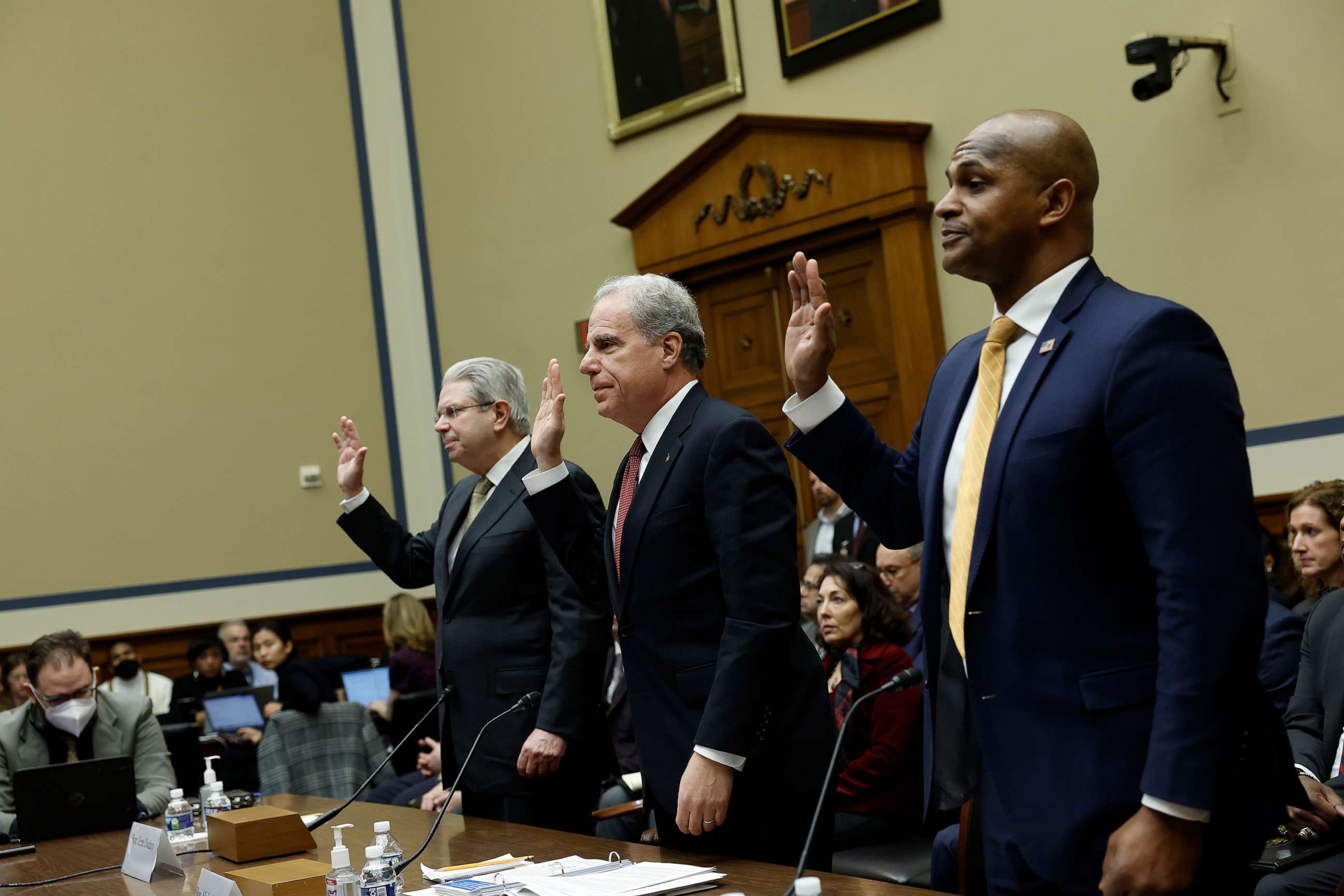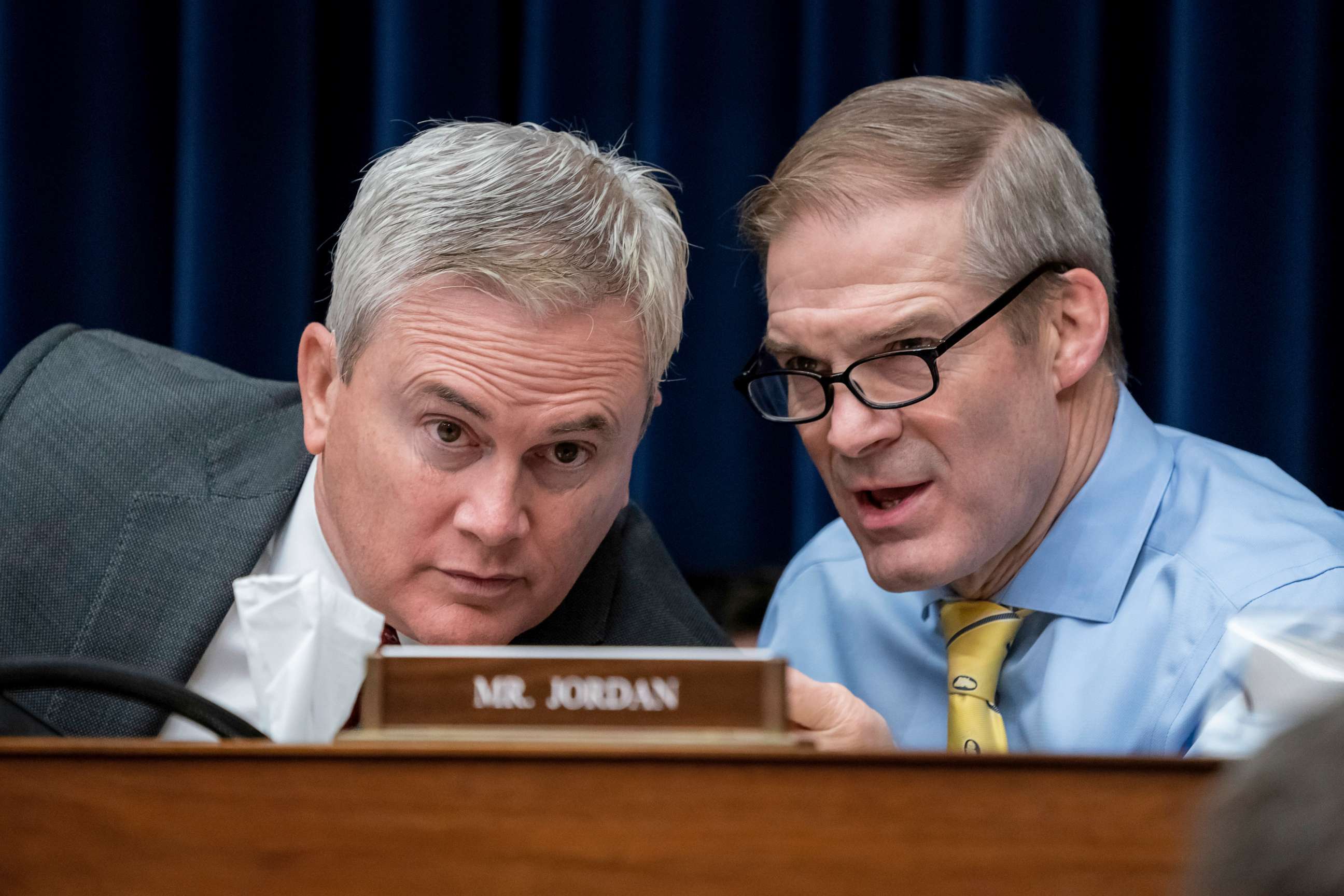House Republicans kick off fraud investigation into billions in COVID pandemic relief money
They called it the "greatest theft of American taxpayer dollars in history."
Kicking off its investigations into the Biden administration, the Republican-led House Oversight Committee on Wednesday held a hearing on the billions of dollars that were scammed from COVID-19 relief programs.
The hearing came on the heels of a new report released Monday that found about $5.5 billion of pandemic aid that was supposed to reach small businesses suffering from COVID-19 shutdowns may have been eaten up by fraudsters instead.
Nearly 70,000 questionable Social Security numbers were used on applications to get grants from the Paycheck Protection Program, according to the report from the Pandemic Response Accountability Committee (PRAC), a government watchdog on pandemic spending. The Social Security numbers didn't match the names of the applicants or their date of births but weren't caught by the application system.
Michael Horowitz, chair of PRAC, was one of the witnesses called to testify before the committee on Wednesday.
Of the $5 trillion total spent on pandemic relief throughout both the Trump and Biden administrations, Horowitz said the amount siphoned off by fraud could be anywhere from tens of billions of dollars to over $100 billion, but that it would be years before the final number was tallied.
The issue, Horowitz said, was that trillion-dollar programs had to get off the ground quickly to prevent potential economic collapse but they lacked key fraud protections, including verification systems and information sharing with other agencies to match up Social Security numbers with peoples' names and birthdates.
"I think the problem at the outset of the pandemic was the lack of preparedness," Horowitz told the committee. "Understanding this was a 100-year event with the pandemic, but we have emergencies all the time, like earthquakes, floods, hurricanes, tornadoes and other disasters … We don't take the steps after an event like this, or smaller ones, to fix what's needed."

Republicans used that data to argue that the programs were a "prescription for waste, fraud and abuse" and haven't been investigated thoroughly enough by Democrats over the last two years of Biden's administration.
But there was also bipartisan agreement on seeking to find the holes in programs that made them ripe for fraud -- to prevent similar situations in the future.
"We owe it to the American people to get to the bottom of the greatest theft of American taxpayer dollars in history," Republican Chairman James Comer of Kentucky told the committee in his opening remarks.
"We must identify where this money went, how much ended up in the hands of fraudsters or ineligible participants and what should be done to ensure it never happens again," Comer said.
The ranking member of the Oversight Committee, Maryland Democrat Jamie Raskin, pushed back on the notion that fraud hasn't been properly investigated over the last two years by citing multiple past hearings -- while also acknowledging that more investigation, in a bipartisan fashion, was necessary.
"Democrats have systematically ferreted out fraud, waste and abuse in pandemic-relief programs, although we all certainly can do a more effective job and that's what this hearing should be about," Raskin said.
He noted that the programs were "by no means perfect" and cited "anachronistic government IT systems, many running obsolete software," that were unable to efficiently respond when unemployment insurance claims ballooned by 30-fold over just three weeks in March 2020. (The Government Accountability Office has estimated that fraud in the unemployment insurance system during the pandemic was at least $4.3 billion but could be as high as $60 billion.)
Still, Raskin heralded the programs' benefits, even with their flaws.
"Recall that, while the former president [Donald Trump] denied and trivialized and dismissed the COVID-19 pandemic, it was Congress which acted responsibly and swiftly and in bipartisan fashion to create and supercharge programs that saved countless businesses and families from bankruptcy and ruin throughout the pandemic," Raskin said.

Rep. Greg Casar, a Democrat from Texas, said that the programs were vital during the height of the pandemic and that the true victims of the fraud were often people who desperately needed the relief.
"I want to be clear: No one in the country is more strongly against fraud than my working-class constituents who needed those COVID dollars to make sure their small businesses kept running, to make sure they got [personal preventive equipment] at work, to ensure they got vaccines, to make sure that house wasn't foreclosed on," Casar said.
"Any dollar taken from those programs by fraudsters is $1 taken away from people who needed support," he said.
As for potential ways to improve government programs at risk of fraud, both Horowitz and Comptroller General Gene Dodaro of the Government Accountability Office, another witness before the Oversight Committee on Wednesday, said it would require more investment in outdated systems and a better balance between preparedness and urgency.
The goal, Dodaro said, was to be able to step in during times of disaster "in a way that gets the funds to the people who need it and not allow this type of fraudulent activity to plague our national programs."
Investigations are still ongoing, including reports on the total amount of fraud discovered by committees like PRAC, which Horowitz urged the committee to keep funding past its targeted end date of 2025 and instead make a permanent fixture to fight fraud.
The Secret Service has also clawed back more than $1.43 billion in funds that were wrongfully obtained, with 2,300 investigations into unemployment insurance fraud and 2,900 investigations into loans and grants given to businesses, according to David Smith, the assistant director of the Office of Investigations within the U.S. Secret Service and another witness at the hearing.
More than 1,000 people have been charged, forced to return money or convicted for defrauding the programs, Smith said.
The White House, now facing multiple House investigations after Republicans won the chamber in last year's midterms, called Wednesday's hearing partisan and pointed to "strict" measures that President Joe Biden backed to limit waste and wrongdoing, compared to the Trump administration.
"House Republicans are holding political stunts that reveal their own hypocrisy and failed past policies," White House spokesman Ian Sams contended in a statement.




